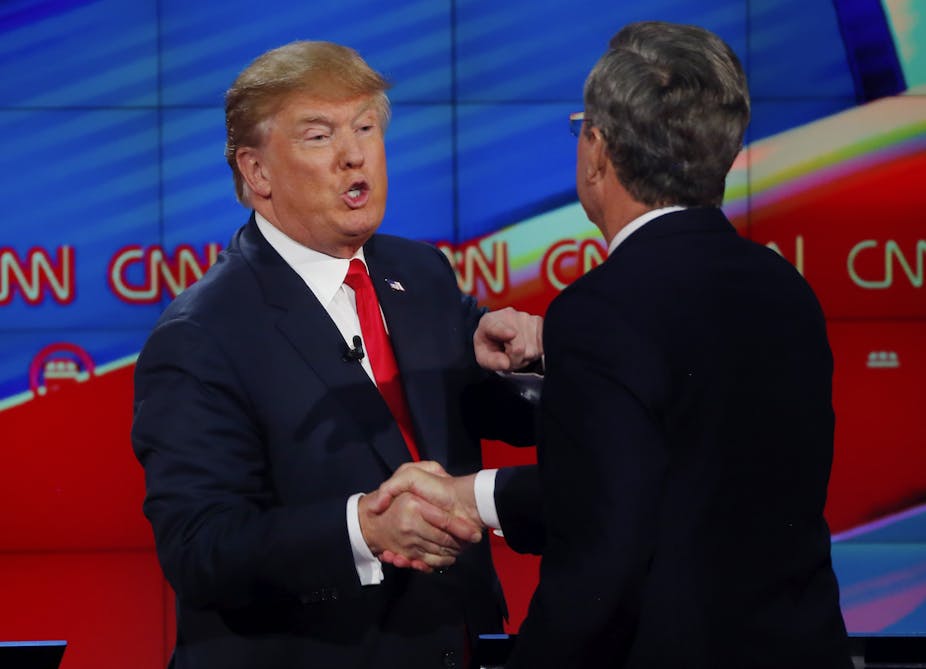Two weeks after a terrorist attack in California, the GOP candidates for president met to discuss foreign policy. We asked two national security experts to grade the ideas they expressed.
Henry Kissinger, how I’m missing you
Bear F Braumoeller, Ohio State University
In the past, foreign policy debates have generally favored Republicans: the party of Nixon and Reagan has long been perceived as more competent when it comes to national security issues. In the context of their party’s history, it is especially surprising that the candidates fared so poorly when it came to articulating a competent policy for dealing with the Islamic State (ISIS).
For example, a competent terrorism policy should at minimum avoid overt violations of international law. Unfortunately, Ted Cruz’s advocacy of carpet bombing territories held by the Islamic State, Ben Carson’s refusal to rule out the bombing innocent children and Donald Trump’s suggestion that we should target the families of terrorists fall into precisely that category.
Once past that low bar, a competent terrorism policy should demonstrate an understanding of the causes of terrorism and the likely effects of antiterror policies, even if those causes and effects are debatable. By my count, most candidates failed this test most of the time. For instance, Cruz, Carson, Jeb Bush and Chris Christie all articulated the logical fallacy that Professor Jack Snyder calls the “paper tiger” myth:
the main opponent is seen as an implacable foe posing an immense security threat, yet at the same time as too weak, inert, or irresolute to combat aggressive countermeasures.
Similarly, Trump’s proposal to fight ISIS by shutting down parts of the internet called into question his understanding of the internet. On the other hand, Bush laid out a detailed plan to combat ISIS and pointed out that alienating Muslims would dramatically undercut it, while Trump gave a sober assessment of the costs of regime change and Rand Paul connected weak states to the spread of extremism.
Admittedly, debates are difficult settings within which to demonstrate the clear understanding of cause and effect necessary to produce an effective foreign policy. Even so, such demonstrations were few and far between last night.
The Emperor’s new clothes – bluster in the GOP
David Alpher, George Mason University The candidates in the last GOP debate of 2015 left us with an image of great toughness and resolve. Unfortunately, what they resolve to do except be tough was never addressed.
Instead, the candidates declared that we will win by winning, defeat enemies by defeating them, and secure ourselves by keeping ourselves secure.
The candidates offered no plans to do anything about the origin of the problems they identified, and no understanding of the problems themselves.
Carly Fiorina suggested technical methods like better algorithms and the quicker embrace of new technology to catch disaffected populations through better surveillance. But she never addressed the complex social problems behind disaffected populations.
Donald Trump, Marco Rubio and Ted Cruz spoke to containing illegal immigration with walls. But any policy suggestions for immigration reform were lost in a crossfire of recriminations about being soft on the undocumented.
Cruz suggested that all terrorists are Muslims even if not all Muslims are terrorists, but neither the other candidates nor the moderators called that statement out for its obvious inaccuracy by pointing out recent examples of domestic, Christian terrorism like the attack on a Charleston church by the white supremacist Dylann Roof.
In the process, the candidates are describing tactics – not solutions – which contain but don’t solve social problems. Historically, that has been an effective way of actually making social problems worse, as the flare of violence around race relations in the US should demonstrate.
Of all of the candidates on stage, the only one who expressed the idea “we need to be smart and think things through” was Jeb Bush.
Ben Carson emphasized the need to be on a war footing, and both he and Ted Cruz refused repeatedly to rule out carpet bombing even if civilian casualties couldn’t be avoided. John Kasich (along with Lindsey Graham in the early debate) stated the need for troops on the ground to destroy ISIS. However, neither offered a new strategy to bring peace to Syria.
The most common statement in this debate was that we can’t keep ourselves safe with the same plans we’ve been using. President Obama was repeatedly criticized for having nothing but policies we’ve already tried and watched fail, but the candidates then suggested the very same policies – kill them, deny them territory, shut down financial and technical capabilities and end the war in Syria. In fact, Obama’s plan is more comprehensive – although relying on force, he does in fact acknowledge the causes behind terrorism and loss of trust in the US and the need to deal with those. A critical difference.
Although Bush stands out for his call to thought, he also failed to provide anything but toughness and force. He made telling statements like “we can’t disassociate ourselves from Muslims” or they won’t stand with us. At first blush that sounds inclusive, but it doesn’t include Muslims as part of “us.” Nevertheless, the need to think was a promising statement, and a very real distinction of his performance during this debate.
The candidates repeatedly expressed that the most important quality of leaders is the ability to act. Bush’s counterpoint of saying “think first, be smart about this,” is important to keep in mind with regard to the state of our democracy overall, and deserved attention it didn’t get. It should be the Republican statement in the primary election – but as things stand, that looks unlikely.

